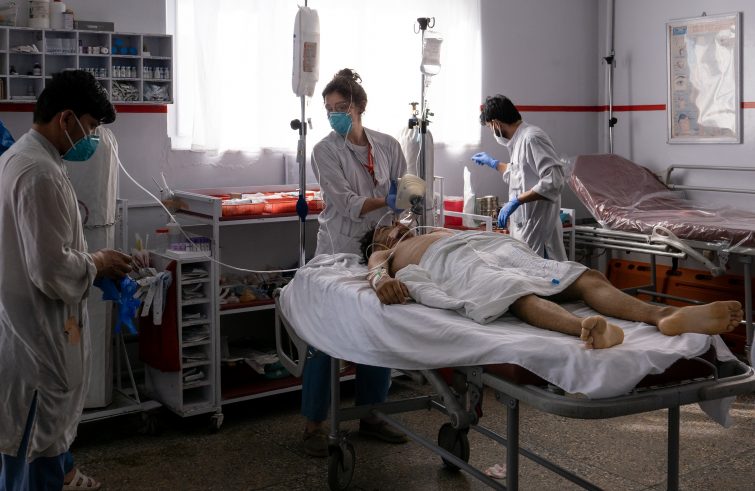
Ornella Spagnolello, 32, divides her time between the ward and the operating room. Originally from Sicily, she graduated in Emergency Medicine. She answered a video call from SIR from the Emergency Hospital in Kabul, where she arrived last June. She has had several “dramatic” experiences: in Sudan, Congo, in Bergamo during the most critical period of the COVID-19 pandemic.
 Doctor Spagnolello, what is the general atmosphere in the city? How are the people you meet coping with this situation of transition and violence in the capital?
Doctor Spagnolello, what is the general atmosphere in the city? How are the people you meet coping with this situation of transition and violence in the capital?
There is an atmosphere of extreme anxiety over the current situation and the future political, social, and economic developments in Afghanistan. Especially given the serious instability and the fact that the future will depend on several factors.
The Emergency hospital in Kabul is probably the most efficient healthcare facility. You must be coping with a huge burden after the recent incidents, including the attack on the airport. Do you have the capacity to treat all the patients?
The Emergency Hospital has 105 beds, three operating rooms that can operate simultaneously. We have six intensive care beds, there is a sub-intensive care unit. We are responding to a very high number of admissions.
Sixty-two patients arrived here within a few hours after the airport attack:
Ten were treated in the emergency room, 36 were admitted to the wards. Sadly, 16 others were already dead when they arrived. Some patients were later transferred to other hospitals in the capital, in coordination with the Ministry of Health.
Which medical treatments were necessary?
Almost all. As a surgical hospital, we have been mostly treating wounds from bullets or explosions, limb, abdomen, head injuries. Many of these patients were in a very serious condition.
Were there any children among them?
Most were 20 to 40 year-old males, but there were also children.
 There are many doctors, nurses and other health workers in the hospital. Are they of different nationalities? How do your colleagues feel about the situation?
There are many doctors, nurses and other health workers in the hospital. Are they of different nationalities? How do your colleagues feel about the situation?
The national, i.e. Afghan, health unit comprises 350 medical staff, in addition to about ten of us “foreign” workers. It must be said that the national staff are fully dedicated to their work, extremely efficient and professional. I must admit that if I were in their shoes I doubt whether I would be able to be as clearheaded. In any case, they too are worried about the situation.
Do you spend your time anywhere in Kabul other than in hospital wards?
For security reasons, non-Afghan nationals hardly ever visit the city, we hardly ever leave the hospital, so we breathe in the atmosphere of the city and the country from our Afghan colleagues.
Honestly doctor, are you not afraid? Do you ever think of returning home?
We are called to confront fear, it’s a constant feeling.
In any case, I’m here because I joined the Emergency project and I intend to honour my commitment.
Besides, among us there are people who look after our safety, which is a priority in all Emergency programmes. Moreover, ours is a “neutral” hospital – neither governmental nor military – and for this reason it is not considered a target.
The recent death of Gino Strada has been mourned worldwide. What is his legacy?
We consider him our mentor. He was a charismatic and determined person who made it possible to embark on and implement extraordinary peace-building projects, the main objective of which is to offer free treatment to the victims of conflicts, regardless of nationality, social standing or religious affiliation. This is also what motivates us in this situation. In doing so, we wish to pay tribute to the figure of Gino Strada.





